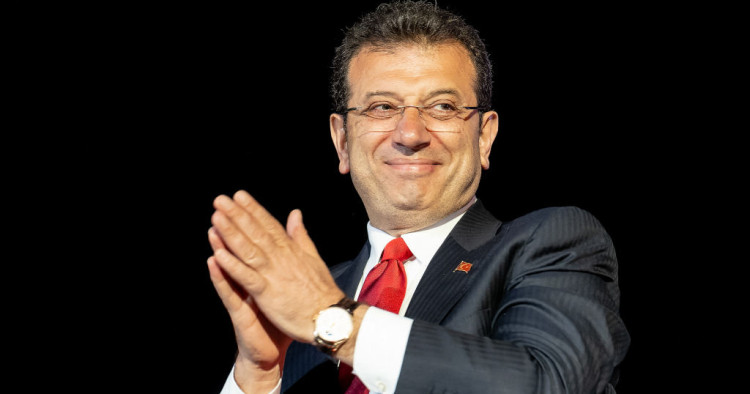Contents:
- Turkey’s municipal elections: A striking rebuke for Erdoğan’s AKP
- US-Israel defense and intelligence cooperation continue despite recent public disagreements
- Iran seeks to insert itself into diplomatic talks on the Palestinian-Israeli conflict
- The new rules of engagement between Israel and Hezbollah
- Attacks on Chinese interests in Pakistan and their geostrategic implications
Turkey’s municipal elections: A striking rebuke for Erdoğan’s AKP
Howard Eissenstat
Non-Resident Scholar

-
Municipal elections in Turkey resulted in an unprecedented and unexpected landslide for the opposition, which took advantage of voter frustration with high inflation and rising unemployment to win not only in major metropolitan areas but also in traditional AKP strongholds.
-
The elections provide the opposition with hope that it will be able to eventually turn the tide of AKP control and raise important questions for Erdoğan, who is constitutionally required to retire at the end of his current term in office.
On Sunday, March 31, Turkey held municipal elections across the county. In advance of the elections, polling seemed to favor the opposition. Nonetheless, many worried that the government’s control of most media and state institutions, along with the lack of a united slate of opposition candidates and a general malaise stemming from the opposition’s lackluster performance in the general elections of 2023, would be sufficient to allow President Recep Tayyip Erdoğan’s Justice and Development Party (AKP) to retake major cities like Istanbul. Instead, the AKP and its allies took a drubbing at the polls, providing a shock to the political system and a much-needed morale boost for the beleaguered opposition. The opposition not only retained its control over the three major metropolitan areas of Ankara, Istanbul, and Izmir, but it overturned long-standing AKP control in towns and cities across the country.
What happened? First, the opposition had more attractive candidates for the municipal elections than it did in the general elections in May and June of 2023. In particular, the success of Ekrem İmamoğlu, who has now won his second term as mayor of Istanbul, demonstrates the ways mayoralties provide the opportunity for Turkish political parties to nurture new, charismatic leaders. Second, in advance of the 2023 elections, Erdoğan’s government took aggressive short-term measures to keep unemployment and inflation artificially low. Since then, a combination of skyrocketing inflation and steps to rationalize the country’s economy has made the lives of everyday Turkish citizens exceedingly painful, with rents and prices for basic commodities rising dramatically. Third, because Erdoğan himself was not running, and because he has given little thought to nurturing charismatic politicians within the ranks of the AKP, his party was represented by lackluster candidates. This was particularly evident in the choice of Murat Kurum as the AKP’s candidate for mayor of Istanbul; Kurum likely looked good on paper and may well be an effective apparatchik, but he was painfully out of his depth on the campaign trail. Finally, the division of the parties and the relatively lower stakes of municipal elections seem to have prompted many traditional AKP voters to vote for opposition candidates. The relative success of the Islamist New Welfare Party (YRP) is especially telling in this regard. By voting for the YRP, voters who would normally have been secure for the AKP could punish the ruling party for both its economic failures and its continued diplomatic and trade relations with Israel.
The repercussions of the election are significant. Erdoğan’s control over the basic structures of state, including the governorships and the courts, and his control of the media remain intact; and it will likely be tempting to use these tools against opposition-controlled municipalities in the coming months. This, after all, was the tactic his government employed after the 2019 elections, when scores of opposition-controlled municipalities were taken over by government-appointed trustees and many newly elected mayors were jailed. At the same time, there are limits to these tactics. Opposition parties have won a much-needed victory, along with the rent provided by control of municipal contracts that will allow them to survive to fight another day.
In the meantime, Erdoğan’s thinking about the future of his party and its role in the nation must surely be in doubt. He has planned to retire at the end of his current five-year term (as he is constitutionally required to do). Can he transfer power to a new generation but retain the AKP’s control of the country? Is a constitutional change possible? These questions must loom large in his mind this week, as he takes stock of the rebuke the voters gave him on Sunday.
US-Israel defense and intelligence cooperation continue despite recent public disagreements
Brian Katulis
Senior Fellow for U.S. Foreign Policy and Senior Advisor to the President

-
A vote at the United Nations calling for a cease-fire and a canceled visit of Israeli officials to discuss Gaza operations received significant media attention, following last week’s revelations of growing gaps between the Biden administration and the Netanyahu government.
-
Yet the two governments continue to coordinate closely on key defense and intelligence issues, including US weapons transfers and intelligence cooperation.
Last week, the gaps between the Biden administration and Israeli Prime Minister Benjamin Netanyahu became even more visible to the public, as seen in a vote at the United Nations and a last-minute cancelation of a senior Israeli delegation to Washington, DC. On March 25, the United States abstained on a vote at the UN Security Council on a resolution calling for an immediate cease-fire, after previously vetoing several similar resolutions. This angered Netanyahu, who canceled a scheduled visit of a senior Israeli delegation to discuss Israel’s plans for a possible military operation in Rafah in southern Gaza and US alternatives. Netanyahu ultimately reversed himself, and the two sides are discussing the next phase of the Gaza war in a videoconference today.
The public rift, along with ongoing public protests in America against the Gaza war, have led some to speculate that this might lead to a bigger break between the United States and Israel. However, when it comes to actual policy coordination on key defense and intelligence issues, these differences may be less than meet the eye, especially in the short term. The public posturing obscures an enduring reality of US-Israel security cooperation, which continues without significant changes.
For example, the Biden administration quietly approved the latest arms transfer to Israel even as the public split unfolded. The package of weapons includes more than 1,800 MK84 2,000-pound bombs and 500 MK82 500-pound bombs, which can be used to destroy tunnels built by Hamas but have raised concerns about mass civilian casualties among Palestinians in Gaza. In addition, the US and Israel continue to work closely together on sharing intelligence — a partnership that has only expanded after the Hamas attack on Oct. 7 that began this war.
The two countries also remain in close coordination on some important short-term issues, including negotiations on a cease-fire and hostage release. Another round of diplomatic talks toward these ends got underway this past weekend, in Cairo, representing a joint effort between the US, Israel, Egypt, and Qatar to forge a deal through indirect talks with Hamas representatives.
Another critical factor helps to drive this continued close working relationship: the many threats both countries face from Iran and its network of regional partners such as the Houthis in Yemen, who continue to undermine regional security and present a risk to the global economy. One reminder of this broader set of threats came this past weekend with a drone strike on an Israeli military facility in the southern port city of Eilat, an attack that an Iraqi militia backed by Iran claimed credit for yesterday. An Israeli attack in Syria today that killed the commander of Iran’s Islamic Revolutionary Guard Corps is another example of this wider threat landscape that keeps America and Israel aligned.
Some bigger gaps between Israel and the US remain in the short term, such as how to achieve the objective of eliminating the threat posed by Hamas. Israel argues it needs to proceed with a military operation in Rafah, where most Palestinians in Gaza have moved; whereas, the Biden administration has continued to question the plan. In addition, the two countries are divided on longer-term strategic questions, such as the creation of a sovereign Palestine as part of a two-state solution.
The bilateral turbulence comes at a time when Netanyahu remains politically weak at home, with domestic protests calling for his removal from power growing in strength and the 2024 election campaign in America heating up. All this amounts to an overall environment that is increasingly unpredictable and volatile, which could be a recipe for bigger shifts in US policy.
Follow: @Katulis
Iran seeks to insert itself into diplomatic talks on the Palestinian-Israeli conflict
Banafsheh Keynoush
Non-Resident Scholar

-
Iran refuses to intervene directly in the Gaza war, preferring to leave open the door to diplomacy, which will enable it to work with the Palestinian groups it backs to shape the future of Gaza through a long-term policy of influence from a safe distance.
-
Tehran is magnifying its network of Palestinian resistance forces on the world stage in an effort to push Israel deeper into political isolation as well as to ensure Iranian views and interests are taken into account in any future post-war Palestinian-Israeli negotiations.
Hamas Political Bureau Chief Ismail Haniyeh’s scheduled trip to Iran in late March — at the same time that the leader of Palestinian Islamic Jihad (PIJ), Ziad al-Nakhalah, also visited the Iranian capital — carried war propaganda value by attempting to shift responsibility for peacebuilding squarely onto Israel’s shoulders. After meeting with Iran’s leaders, Hamas said their talks had highlighted the need for action on several fronts. Above all, the group declared, any indirect negotiations with Israel over a cease-fire should be conditioned on a halt to the attack on Gaza, a full withdrawal of Israeli forces, guarantees of return for Palestinians who fled the conflict zone, the delivery of humanitarian assistance to those war-torn areas, and the simultaneous release of Palestinian detainees.
Israeli Prime Minister Benjamin Netanyahu suggested that Hamas was making delusional demands. But Iran dug in on the side of its Palestinian ally, betting on Israel becoming isolated politically. The latest evidence of this, in Tehran’s eyes, was last week’s United Nations Security Council (UNSC) resolution calling for a cease-fire in the Gaza war, which the United States did not veto.
Iran refuses to intervene directly in this conflict, preferring to leave open the door to diplomacy, which will enable it to work with the Palestinian groups it backs to shape the future of Gaza through a long-term policy of influence from a safe distance. By pushing Hamas to the fore, Iran is also signaling that the group is integral to the wider Palestinian cause. In other words, a pro-Iranian Hamas becomes a pivot on which the Palestinian cause turns, with Iranian funding and support.
Tehran is magnifying its network of Palestinian resistance forces on the world stage. Recently, two Iranian regional allies — the splinter Palestinian groups Katai’bah Qaffin (affiliated with the Saraya al-Quds, the military branch of PIJ) and Katai’bah Shuhada al-Quds — have, on separate occasions, forewarned the intelligence service of the Palestinian Authority in the West Bank to stop detaining resistance forces, contending that such activities constitute aid to Israel. Moreover, they stressed to Ramallah that apprehension of these resistance units and their fighters constitute red lines that, if crossed, will lead to painful responses.
The goal of such support and messaging is to push Israel deeper into political isolation, robbing it of strategic options to decisively deliver a final blow against Hamas and other pro-Iranian Palestinian fighters. Not surprisingly, in Tehran, Haniyeh made a point of stressing that Israel faced “unprecedented political isolation.” The Tasnim News Agency, affiliated with Iran’s Islamic Revolutionary Guards Corps, tapped into the same narrative this week, reminding its readers that inhumane conditions prevailing in Gaza were due to Israel targeting health centers in conflict zones.
These messages help Iran achieve another key objective. They signal to the US that Iran’s regional diplomatic role is vital to a future Palestinian solution. Washington had not heretofore considered Tehran a serious actor in international negotiations to resolve the Israeli-Palestinian conflict. But with rifts emerging between the US and Israel over the latest UNSC resolution, Tehran is hoping it will be seen and heard this time by policymakers in Washington. Not surprisingly, Iran’s foreign ministry has been busy thanking the international community for holding pro-Palestinian demonstrations in world capitals, while calling on strengthening the resistance to what it terms hazardous adventurism by the Israeli government. Tehran clearly wants its views and interests taken into account in any future post-war Palestinian-Israeli settlement.
Follow: @BanafshKeynoush
The new rules of engagement between Israel and Hezbollah
Saleh El Machnouk
Non-Resident Scholar

-
Despite the heightened rhetoric, the events of the past weeks signal not an escalation per se but rather the solidification of new, post-Oct. 7 rules of engagement between Israel and Hezbollah.
-
With Israel’s military operation in Rafah scheduled to last well into the fall, it remains to be seen whether the diplomatic effort in Lebanon can sustain a six-month pause.
In the past several weeks, Israel was widely perceived as having escalated its attacks on Hezbollah targets inside Lebanon, igniting fears of an all-out war, one which the United States has made clear it adamantly seeks to avoid.
This perception was born out of recent Israeli air raids, including a March 24 strike on Baalbek, a Hezbollah stronghold in eastern Lebanon located well away from the south, and by a series of airstrikes that made March 27 one of the deadliest days in southern Lebanon in this conflict so far.
It was later reinforced by Israeli Defense Minister Yoav Gallant stressing on March 29 that Israel will “increase the rate of attacks in the north” as well as “reach wherever the organization [Hezbollah] operates, in Beirut, Damascus, and in more distant places.”
Despite the heightened rhetoric, however, the events of the past weeks signal not an escalation per se but rather the solidification of new (temporary) rules of engagement between the two parties, ones predicated on Israel’s targeting of Hezbollah militants involved in military activities in the south as well as its senior military commanders. Concurrently, while is it increasingly clear that both Israel and Hezbollah wish to prevent a wider war, and that a zone of possible agreement exists, this does not necessarily suggest that a diplomatic solution is on the horizon or that an all-out confrontation can be averted.
Hezbollah has made it clear that, in its effort to support Hamas, it will continue to attack Israel as long as there is no “cease-fire in Gaza,” a vague objective that might not materialize for months or even years. The organization has also refused to engage in negotiations with US and French mediators as long as fighting in Gaza persists.
Back in February, the French foreign minister delivered a written proposal for a truce to officials in Beirut, one that included Hezbollah forces withdrawing 10 kilometers from the border (a much lower benchmark than the one required by United Nations Security Council Resolution 1701) as well as negotiations regarding border disputes and an enhanced presence for the Lebanese Armed Forces, only to have it hastily rejected by the organization’s negotiators.
For its part, Israel has repeatedly stressed that it will not allow a return to the status quo ante, and that the situation in northern Israel must change to allow over 80,000 displaced Israelis to return home. The details of what this entails remains unclear, although there is no indication to date that the Israeli government opposes the French proposal.
With the Israeli military’s operation in Rafah scheduled to last well into the fall, it remains to be seen whether the diplomatic effort in Lebanon can sustain a six-month pause. Even then, despite the overall parameters of a potential deal becoming increasingly clear, the devil will be in the (many) details, most notably the UN Interim Force in Lebanon’s ability to rigorously certify the agreement’s implementation.
Attacks on Chinese interests in Pakistan and their geostrategic implications
Marvin G. Weinbaum
Director, Afghanistan and Pakistan Studies
Naad-e-Ali Sulehria
Research Assistant, Afghanistan and Pakistan Studies
-
Pakistan has experienced five major terrorist attacks in two weeks, including three targeting Chinese interests, with the latest resulting in the deaths of five Chinese nationals; in response to these attacks, Chinese companies have suspended their operations, leading to significant economic losses for Pakistan.
-
In judging the terrorism situation as possibly more than Pakistan’s military can handle, Beijing may now renew an offer to deploy Chinese security forces or even set up military bases inside Pakistan — an outcome both Washington and New Delhi want to avoid.
The recent surge in terrorism targeting key strategic facilities and development projects of the multibillion-dollar China-Pakistan Economic Corridor (CPEC) in Pakistan has created a troubling situation for the newly formed government. Already grappling with challenging economic conditions and a deteriorating security environment, the government in Islamabad now faces heightened concerns. Over the course of just two weeks, Pakistan has experienced five major attacks, three of which have directly targeted Chinese interests. The latest to date resulted in the deaths of five Chinese engineers working on the Dasu hydropower project in the Khyber Pakhtunkhwa province, overseen by the Power Construction Corporation of China, which is also involved in other key hydroelectric projects in Pakistan. In response to these attacks, Chinese companies have suspended their operations, leading to significant economic losses for Pakistan, including layoffs at these sites of around 2,000 workers.
Attacks on Chinese interests come at the time when the Pakistani and Chinese governments have agreed to expedite the second phase of CPEC, starting with the development of special economic zones (SEZs) in Pakistan. Worried about the possibility that CPEC projects could be derailed, Pakistan’s civil-military leadership has reiterated promises to ensure the safety and security of Chinese nationals. It has also asserted the involvement of foreign hands aiming to sabotage Pakistan-China strategic relations. Authorities in Pakistan have long accused the Indian spy agency Research and Analysis Wing (R&AW) of staging attacks on Chinese interests inside the country through its proxies. So far, unlike the two terrorist attacks on Chinese facilities claimed by the Balochistan Liberation Army, no group has claimed responsibility for attacking the Chinese engineers. Authorities in Islamabad have pointed to their usual terrorist suspect, Tehreek-e-Taliban Pakistan (TTP). Yet in a statement issued by the TTP, the group distanced itself from any actions targeting Chinese interests — a disclaimer with some plausibility as it could injure China’s relations with the TTP’s patron, the Afghan Taliban.
China and Pakistan have jointly formed an investigation team tasked with probing the attacks. To support the Pakistan Army in its fight against terrorism, China could extend its investments to a financially strained military seeking help for its costly counterterrorism activities. In the past, Chinese authorities have made several attempts to establish their own security companies in Pakistan to aid in protecting CPEC projects, but Pakistan has politely turned down such offers. However, Beijing, in judging the terrorism situation as possibly more than the Pakistan military can handle, may now renew an offer to deploy Chinese security forces or even set up military bases inside the country. Allowing such a Chinese military presence would amount to an admission by Pakistan that it is incapable of meeting its domestic counterterrorism challenges. It would also undermine the military’s proud claim to be the nation’s savior in providing for its national security. Moreover, any deployment of Chinese forces in Pakistan is bound to have a serious impact on the latter country’s relations with the United States as well as sound alarms in New Delhi over Chinese ambitions in South Asia. The picture is already complicated regionally, with Pakistan’s initial findings that the terrorists in the recent attack on Chinese nationals used US-provided weaponry smuggled from Afghanistan.
Pakistan has for some time complained it bears the brunt of increased terrorism due to the flawed US withdrawal from Afghanistan. Of late, the civil-military establishment carefully implies that unless the US ramps up its counterterrorism cooperation, Pakistan might have to rely more on the Chinese. Islamabad’s request may have resonated in Washington. For the first time in years, an American president has made personal contact with a Pakistani prime minister. President Joe Biden very recently sent a letter to Prime Minister Shehbaz Sharif, expressing the US’s continuing strong interest in working together with Pakistan. While this unanticipated letter from the Biden administration only reaffirms existing US support for Pakistan, it can also be read as sending a message that the Pakistan Army should not consider allowing Chinese boots on the ground.
Follow: @mgweinbaum
Photo by YAGIZ GURTUG/Middle East Images/AFP via Getty Images
The Middle East Institute (MEI) is an independent, non-partisan, non-for-profit, educational organization. It does not engage in advocacy and its scholars’ opinions are their own. MEI welcomes financial donations, but retains sole editorial control over its work and its publications reflect only the authors’ views. For a listing of MEI donors, please click here.













